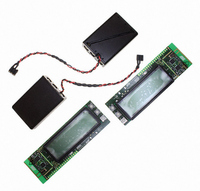ATR2406-DEV-KIT2 Atmel, ATR2406-DEV-KIT2 Datasheet - Page 20

ATR2406-DEV-KIT2
Manufacturer Part Number
ATR2406-DEV-KIT2
Description
KIT DEMO FOR ATR2406/ATMEGA88
Manufacturer
Atmel
Series
Smart RFr
Type
Transceiver, ISMr
Datasheet
1.ATR2406-DEV-BOARD.pdf
(25 pages)
Specifications of ATR2406-DEV-KIT2
Frequency
2.4GHz
Wireless Frequency
2.4 GHz
Interface Type
SPI
Modulation
GFSK
Operating Voltage
2.9 V to 3.6 V
Operating Temperature Range
- 10 C to + 60 C
For Use With/related Products
ATR2406
Lead Free Status / RoHS Status
Contains lead / RoHS non-compliant
10. Appendix: Current Calculations for a Remote Control
20
ATR2406
Assumptions:
Basic Numbers:
Amount of Current Needed to Transmit One Packet:
Protocol
Channel
Loop filter
Handheld device
Base station device
Peak current ATR2406 in TX at 1.152 Kbits/s
Peak current ATR2406 in RX at 1.152 Kbits/s
Peak current ATR2406 with synthesizer running
Current ATmega88 active
Current ATmega88 power down (no WDT)
Current ATmega88 power down (+ WDT)
Loop settling time of ATR2406
Configuration of ATR2406
Time needed for exchanging a packet at 1.152 Kbits/s
Q1 = (0.005A + 0.026A)
Q2 = (0.005A + 0.026A)
Q3 = (0.005A + 0.026A)
Q4 = (0.005A + 0.042A)
Q5 = (0.005A)
Q6 = (0.005A + 0.026A)
Q7 = (0.005A + 0.026A)
Q8 = (0.005A + 0.057A)
Q9 = (0.005A + 0.057A)
Q10 = (0.005A + 0.057A)
250 µs = 1.25 µAs (charge for turn around (TX to RX, RX to TX, etc.))
A data packet consists of 24 bytes.
24 bytes = 240 bits (USART connection)
T
The system will use five predefined channels for frequency hopping spread
spectrum (FHSS) which gives improved immunity against interferers
Loop filter settling time will be 110 µs
If not in use, the handheld device will be in power-down mode with the AVR’s
watchdog timer disabled. The AVR power-down current is typically 1.25 µA. If
an external voltage regulator is used, additional power-down current has to be
taken into account
The base station will periodically scan all the channels of the used subset. The
base station will stay on one channel for 2 seconds. If the base station receives
a correct packet, an acknowledge will be returned to the handheld device. The
power consumption of the base station device is not power-sensitive, as this
part of the application is normally mains powered
5030 µs = 155 µAs (charge up time ATR2406 + AVR internal calculations)
30 µs = 0.93 µAs (charge for configuring the ATR2406)
110 µs = 3.41 µAs (charge for settling the loop filter)
210 µs = 9.87 µAs (charge for transmitting the packet)
30 µs = 0.93 µAs (charge for configuring the ATR2406)
60 µs = 1.86 µAs (charge for settling the loop filter)
50 µs = 3.10 µAs (charge until valid data can be received)
210 µs = 13.02 µAs (charge for receiving the packet)
packet_length
50 µs = 3.1 µAs (charge for latency before receiving)
= 210 µs at 1.152 Mbits/s
42 mA
57 mA
26 mA
5 mA
1.25 µA
5 µA
110 µs
30 µs
210 µs
4779N–ISM–12/08



















